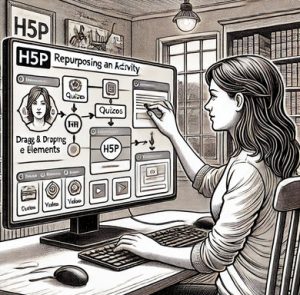 There are thousands of H5P learning objects available online through repositories, open education resources and shared courses. Many of them have a Reuse button. By clicking on this button, educators can download an H5P and use it as it is or they can customize the H5P.
There are thousands of H5P learning objects available online through repositories, open education resources and shared courses. Many of them have a Reuse button. By clicking on this button, educators can download an H5P and use it as it is or they can customize the H5P.
H5P, HTML5 Package, is an online set of tools that facilitates the creation and sharing of interactive, multimedia content. These are normally used for educational purposes. They enhance learner engagement with interactivity, immediate feedback and mixed media. H5P offers a variety of content types like quizzes, interactive videos, presentations, and games, which can be easily integrated into online learning platforms such as Canvas, Moodle or Brightspace. One of the best attributes of H5P is the ability to customize existing H5Ps. This can save time, energy and development costs. It also saves training time for teacher-developers.
Continue reading









